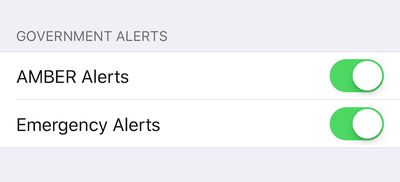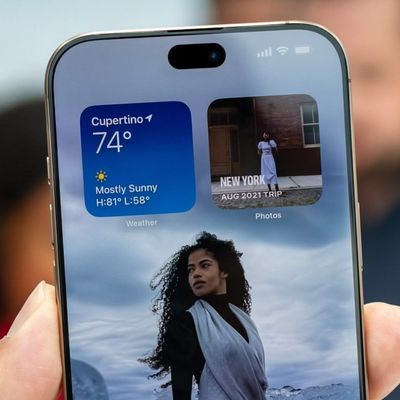Currently, when users in a certain area face potentially bad weather, threats of danger, or a nearby AMBER alert, their iPhone or other smartphone sounds off and displays a message explaining the emergency.
In new legislation shared today, United States senators Brian Schatz and John Thune hope to "explore" ways this system could improve to enhance reliability, including implementing these alerts into audio and video online streaming services (via TechCrunch)

According to the Reliable Emergency Alert Distribution Improvement (READI) Act, more people would be successfully alerted to and aware of potential emergencies if these alerts played on services like Netflix and Spotify. In these situations, the legislation argues, users might have left their smartphone behind in another part of the house while streaming on a TV or computer, missing an alert in the process.
Senator Schatz explained that the mishap with the false missile alert in Hawaii earlier this year "exposed real flaws in the way people receive emergency alerts," inspiring change and the new legislation.
“When a missile alert went out across Hawai‘i in January, some people never got the message on their phones, while others missed it on their TVs and radios. Even though it was a false alarm, the missile alert exposed real flaws in the way people receive emergency alerts,” said Senator Schatz, lead Democrat on the Subcommittee on Communications, Technology, Innovation, and the Internet. “Our bill fixes a number of important problems with the system responsible for delivering emergency alerts. In a real emergency, these alerts can save lives so we have to do everything we can to get it right.”
“Emergency alerts save lives but management mistakes can erode their credibility and effectiveness. The READI Act implements lessons learned from past incidents and recognizes that emergency protocols must change along with communication technology,” said Senator Thune, Chairman of the Committee on Commerce, Science, and Transportation.
Other aspects of the READI Act also propose eliminating the option for users to opt out of receiving "certain" federal alerts, like missile alerts, on smartphones. For iPhone, users can toggle off AMBER Alerts and Emergency Alerts completely under the "Government Alerts" section in Notifications settings.

Otherwise, the legislation would encourage State Emergency Communications Committees to "periodically review and update" their own alert system plans to keep them more up-to-date, as well as compel FEMA "to create best practices" for state, tribal, and local governments for issuing alerts, avoiding false alerts, and retracting false alerts if they happen. This false alert system would also see a reporting system implemented under the READI Act so the FCC can track when they occur and "examine their causes."





















Top Rated Comments
Personally I turn my alerts off. Waaayyyyy too many irrelevant alerts, mainly for bad weather that may be miles away, that made the service worse than nothing at all. Until they can get their **** straight and use it only for imminent mass casualty events like an incoming nuclear missile or a nerve gas attack in my area then I'll continue to keep it disabled.
[doublepost=1532020160][/doublepost]I strongly disagree with making Amber alerts unable to opt out. I don't have a problem with them texting me unobtrusively with non-emergency messages like that, but the last thing I need is to have my phone blaring its emergency siren right in the middle of a meeting just for an alert that I can do nothing about at that particular time. If it doesn't affect EVERYBODY and require an IMMEDIATE response for personal safety then it shouldn't be sent out on the alert system.
This legislation seems to address several key issues:
* Most people no longer watch live TV or listen to the radio, which in the past have been the ways that emergency alerts get pushed out. We have replaced these with streaming services or at least DVR.
* Now in an ideal world, it would be great to push this out to the individual devices instead of relying on the services, but in reality many devices that are currently available would not have the ability to receive such a signal, so relying on the services actually makes more sense.
* This eliminates the ability to opt out of these very important alerts and yes, the Amber alerts are important and can literally save lives, as can the other emergency alerts.
* This also establishes a program to reduce the number of false alerts and hopefully eliminate them all together, which would include things like the person talking about an alert that it was going to be 85 degree outside, that would be a false alert.